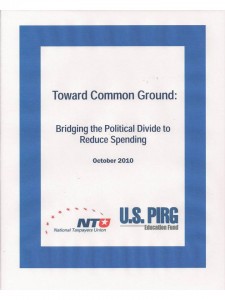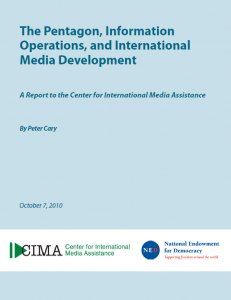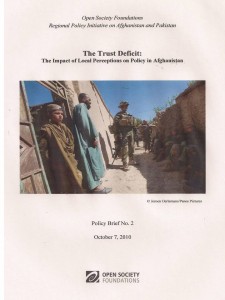 Cheering for Osama: How jihadists use internet discussion forums
Cheering for Osama: How jihadists use internet discussion forums
by Mohammed Ali Musawi
 Cheering for Osama: How jihadists use internet discussion forums
Cheering for Osama: How jihadists use internet discussion forums
by Mohammed Ali Musawi

The U.S. Public Interest Research Group (U.S. PIRG) and National Taxpayers Union (NTU) have joined together to propose a list of 30 specific recommendations to reform our future spending commitments. If enacted in their entirety, these changes would save taxpayers over $600 billion in total by 2015, the target date for the Fiscal Commission to reduce our publicly-held debt-to- GDP ratio to a more sustainable level of 60 percent.

While our organizations have often differed about the proper regulatory scope of government and a host of tax policies, we are united in the belief that we spend far too much money on ineffective programs that do not serve the best interests of the American people.
The cuts deal with specific reforms to entitlement programs, defense spending, wasteful subsidies and a broad range of discretionary items of a smaller scale. While these proposals won’t get us all the way there, it is a start that could establish some common ground and make government more accountable in the process.
Phi Beta Iota: The cuts are glaringly obvious and glaringly representative of the deliberate unwillingness of the Congress to properly represent the tax payer and the public interest. However, the cuts do not go nearly far enough, leaving most of the military budget intact, avoiding the intelligence budget completely, and generally not thinking in new terms such as the elimination of all income taxes, substituting the Automatic Payment Transaction (APT) tax.

CIMA is pleased to release a new report, The Pentagon, Information Operations, and Media Development, by Peter Cary, a veteran journalist with extensive experience reporting about the U.S. military. As part of its post-9/11 strategy, the Department of Defense has launched a multi-front information war, both to support its troops on the ground and to counter the propaganda of radical Muslim extremists. The DoD’s global public relations war, however, has fostered criticism that the department has over-reached and tarred the efforts of non-DoD Americans doing media development work abroad.
While the DoD cannot be criticized for trying to protect the lives of its soldiers, it has spent vast amounts of money on media operations–which can tend to be conducted in secrecy and whose effectiveness often cannot be measured. This report examines the impact of DoD information operations on international media development efforts and offers recommendations – including that the DoD leave media activities that could be considered public diplomacy to the State Department.
Tip of the Hat to Niels Groeneveld at LinkedIn.
The ICAF is a framework that can be used to help people from different U.S. government departments and agencies work together to reach a shared understanding of a country’s conflict dynamics and consensus on potential entry points for additional U.S. government efforts. This assessment will provide for a deeper understanding of the underlying conflict dynamics in your country or region.
ICAF teams are situation-specific and should include Department/agency representatives with relevant technical or country expertise. ICAF teams are often co-led by the Conflict Prevention division of S/CRS and USAID’s Office of Conflict Management and Mitigation because people in those offices have conflict assessment expertise, but anytime two or more Departments/agencies want to conduct an ICAF, they may do so. Unless they have conflict assessment experience, however, they should request assistance from S/CRS/CP or USAID/CMM.
An ICAF allows an interagency team to identify potential entry points for future U.S. government efforts in conflict prevention and conflict transformation, but it does not make direct recommendations for program design. That is the role of the Sectoral Assessment. Use of sectoral assessments is consonant with use of ICAF in the following ways:
Download the ICAF Document for more details.

The below report by the Open Society Foundations (a Soros project) is extremely important and should get the widest distribution. It documents the cumulative blowback caused by our narcissistic ideas about how to win the hearts and minds of the Afghans. It does this by systematically examining the views of a wide variety of Afghans in an effort to construct an Afghan narrative of how the intervention is affecting their lives. That this narrative is often at variance with our views (which makes it easy to dismiss by western military leaders), the report shows why this is really quite beside the point. Of particular interest (at least to me) is the Afghan narrative of the psychological effects of collateral damage cause by our all-seeing, all-knowing precision strike systems. It is a classic on how the ongoing self-referencing BS about the performance of these weapons is blowing back on itself to magnify the atmosphere of mistrust and alienation that is playing directly into the success of the insurgent's guerrilla strategy.
Of course, this report might be easily dismissed by those patriotic Amurikans, drunk on High Tea, as the subversive product of the lefty Hungarian-emigre George Soros, who is, after all, just another ‘other.'

Phi Beta Iota: A properly managed intelligence campaign would have anticipated and then closely monitored this kind of situational awareness. It is called “Intelligence Preparation of the Battlefield.” Neither CIA nor DIA know how to do this.
See Also:
Reference: Fixing Intel–A Blueprint for Making Intelligence Relevant in Afghanistan
Review: Operation Dark Heart–Spycraft and Special Ops on the Frontlines of Afghanistan — and the Path to Victory
Review: Surrender to Kindness (One Man’s Epic Journey for Love and Peace)
2010 INTELLIGENCE FOR EARTH: Clarity, Diversity, Integrity, & Sustainability

The Next Generation of Small Unit Warfare [NOTES]
A Lunch Discussion with Major General (ret.) Robert H. Scales, PhD
Monday, September 27, 2010, 12:00 pm — 1:30 pm
The Brookings Institution, Stein Room, 1775 Massachusetts Ave, NW, Washington, DC
The 21st Century American military it has found itself fighting two extended land wars, neither against a nation state or conventional armed forces. Our forces have responded to with changes in doctrine, and the introduction of new technologies to the integration of new human resources in the form of contractors, translators, and human terrain experts. But where will we go from here? In his recent work, Scales has focused on how changes in selection, training, and organization might make future small units not only more powerful, but also the backbone of our operations.
Major General (ret.) Robert H. Scales is an authority on both land warfare and leadership development. Prior to his current position, as President of Colgen, LP, he served for over thirty years in the Army, in command and staff positions in the United States, Germany, and Korea. Scales ended his military career as the Commandant of the United States Army War College. In 1995 he created the Army After Next program which was the Army’s first attempt to build a strategic gaming and operational concept for future land warfare. He has written three works: Future Warfare, Yellow Smoke: the Future of Land Warfare for America’s Military, and The Iraq War: A Military History. He is a graduate of West Point and holds a PhD in History from Duke University.
See Also: Review: Firepower In Limited War
Inspired by Attending this Briefing:
Journal: Reflections on Integrity
Dr. Peter W. Singer, Director of the 21st Century Defense Initiative at Brookings, will introduce and moderate the discussion.